The Cambridge History of China. Vol. 13: Republican China 1912-1949, Part 2
Подождите немного. Документ загружается.

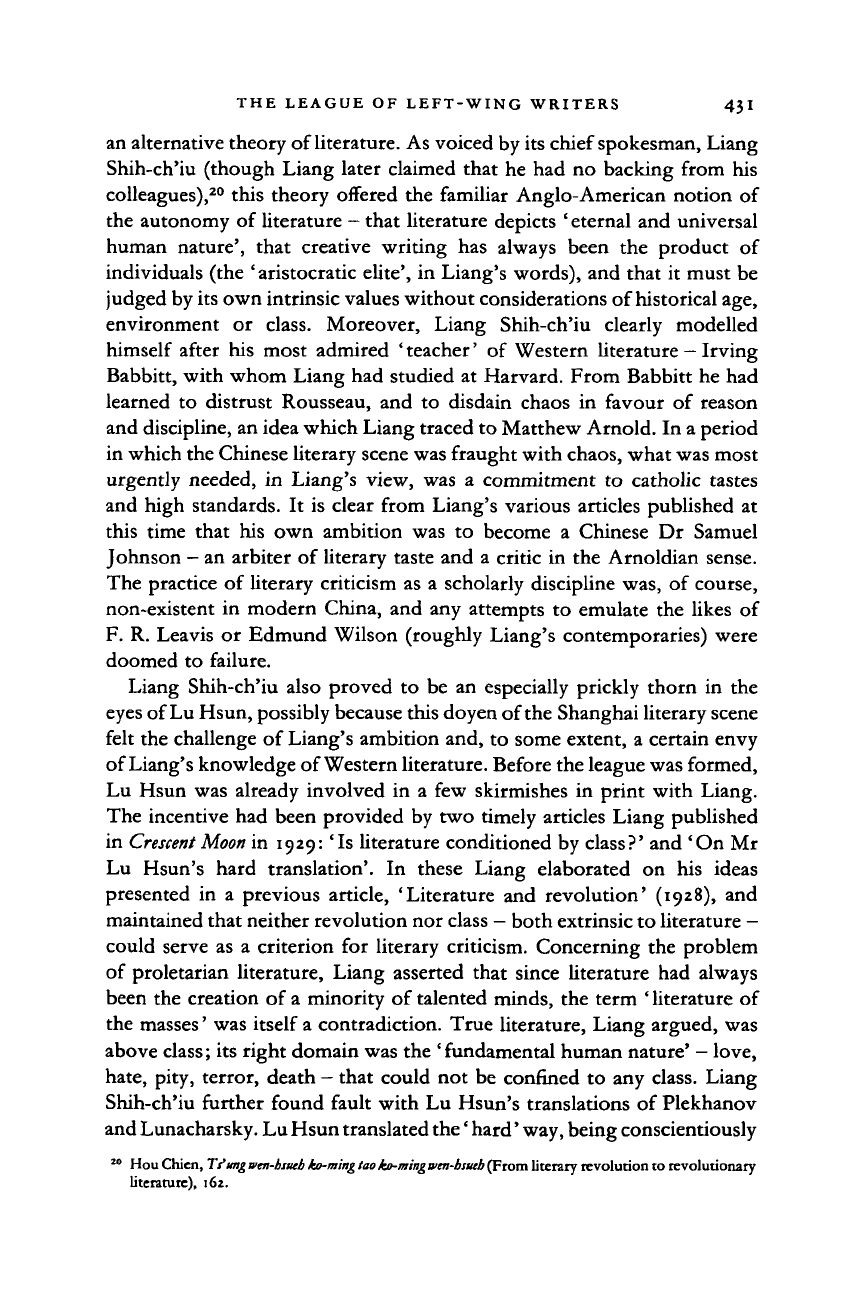
THE LEAGUE OF LEFT-WING WRITERS 43 I
an alternative theory of literature. As voiced by its chief spokesman, Liang
Shih-ch'iu (though Liang later claimed that he had no backing from his
colleagues),
20
this theory offered the familiar Anglo-American notion of
the autonomy of literature - that literature depicts
'
eternal and universal
human nature', that creative writing has always been the product of
individuals (the ' aristocratic elite', in Liang's words), and that it must be
judged by its own intrinsic values without considerations of historical age,
environment or class. Moreover, Liang Shih-ch'iu clearly modelled
himself after his most admired ' teacher' of Western literature - Irving
Babbitt, with whom Liang had studied at Harvard. From Babbitt he had
learned to distrust Rousseau, and to disdain chaos in favour of reason
and discipline, an idea which Liang traced to Matthew Arnold. In a period
in which the Chinese literary scene was fraught with chaos, what was most
urgently needed, in Liang's view, was a commitment to catholic tastes
and high standards. It is clear from Liang's various articles published at
this time that his own ambition was to become a Chinese Dr Samuel
Johnson - an arbiter of literary taste and a critic in the Arnoldian sense.
The practice of literary criticism as a scholarly discipline was, of course,
non-existent in modern China, and any attempts to emulate the likes of
F.
R. Leavis or Edmund Wilson (roughly Liang's contemporaries) were
doomed to failure.
Liang Shih-ch'iu also proved to be an especially prickly thorn in the
eyes of Lu Hsun, possibly because this doyen of the Shanghai literary scene
felt the challenge of Liang's ambition and, to some extent, a certain envy
of Liang's knowledge of Western literature. Before the league was formed,
Lu Hsun was already involved in a few skirmishes in print with Liang.
The incentive had been provided by two timely articles Liang published
in
Crescent Moon
in 1929: 'Is literature conditioned by class?' and 'On Mr
Lu Hsun's hard translation'. In these Liang elaborated on his ideas
presented in a previous article, 'Literature and revolution' (1928), and
maintained that neither revolution nor class - both extrinsic to literature -
could serve as a criterion for literary criticism. Concerning the problem
of proletarian literature, Liang asserted that since literature had always
been the creation of a minority of talented minds, the term ' literature of
the masses' was itself a contradiction. True literature, Liang argued, was
above class; its right domain was the ' fundamental human nature' - love,
hate,
pity, terror, death - that could not be confined to any class. Liang
Shih-ch'iu further found fault with Lu Hsun's translations of Plekhanov
and Lunacharsky. Lu Hsun translated the' hard' way, being conscientiously
20
Hou Chien, Tiung
wen-bsutb
ko-ming tao ko-ming
wen-bsutb
(From literary revolution to revolutionary
literature), 162.
Cambridge Histories Online © Cambridge University Press, 2008
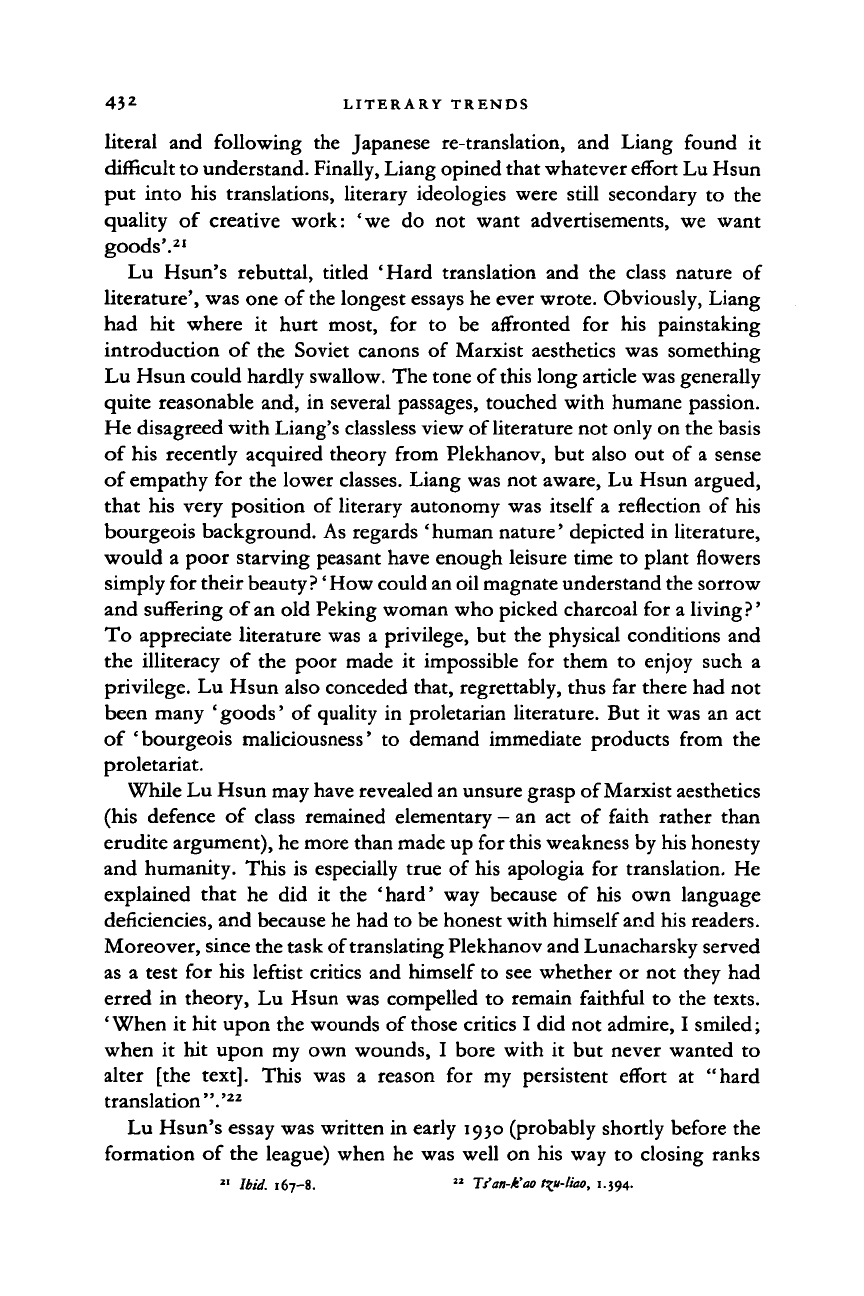
43
2
LITERARY TRENDS
literal
and
following
the
Japanese re-translation,
and
Liang found
it
difficult to understand. Finally, Liang opined that whatever effort Lu Hsun
put into
his
translations, literary ideologies were still secondary
to the
quality
of
creative work:
'we do not
want advertisements,
we
want
goods'.
21
Lu Hsun's rebuttal, titled 'Hard translation
and the
class nature
of
literature', was one
of
the longest essays he ever wrote. Obviously, Liang
had
hit
where
it
hurt most,
for to be
affronted
for his
painstaking
introduction
of the
Soviet canons
of
Marxist aesthetics
was
something
Lu Hsun could hardly swallow. The tone
of
this
long article was generally
quite reasonable and,
in
several passages, touched with humane passion.
He disagreed with Liang's classless view of literature not only on the basis
of his recently acquired theory from Plekhanov,
but
also
out of a
sense
of empathy
for the
lower classes. Liang was
not
aware,
Lu
Hsun argued,
that
his
very position
of
literary autonomy was itself
a
reflection
of his
bourgeois background. As regards 'human nature' depicted
in
literature,
would
a
poor starving peasant have enough leisure time
to
plant flowers
simply for their beauty? 'How could an oil magnate understand the sorrow
and suffering
of
an old Peking woman who picked charcoal
for
a living?'
To appreciate literature was
a
privilege,
but the
physical conditions
and
the illiteracy
of the
poor made
it
impossible
for
them
to
enjoy such
a
privilege.
Lu
Hsun also conceded that, regrettably, thus
far
there had
not
been many ' goods'
of
quality
in
proletarian literature.
But it
was
an act
of 'bourgeois maliciousness'
to
demand immediate products from
the
proletariat.
While Lu Hsun may have revealed an unsure grasp of Marxist aesthetics
(his defence
of
class remained elementary
—
an
act of
faith rather than
erudite argument), he more than made up
for
this weakness by his honesty
and humanity. This
is
especially true
of
his apologia
for
translation.
He
explained that
he did it the
'hard'
way
because
of his own
language
deficiencies, and because he had
to
be honest with himself and his readers.
Moreover, since the task of translating Plekhanov and Lunacharsky served
as
a
test
for his
leftist critics
and
himself to see whether
or not
they
had
erred
in
theory,
Lu
Hsun was compelled
to
remain faithful
to the
texts.
'When
it hit
upon the wounds
of
those critics
I did not
admire,
I
smiled;
when
it hit
upon
my own
wounds,
I
bore with
it but
never wanted
to
alter
[the
text].
This
was a
reason
for my
persistent effort
at
"hard
translation".'
22
Lu Hsun's essay was written
in
early 1930 (probably shortly before
the
formation
of
the league) when
he was
well
on his way to
closing ranks
21
Ibid.
167-8.
"
Tfan-Hao
t^u-liao,
1.394.
Cambridge Histories Online © Cambridge University Press, 2008
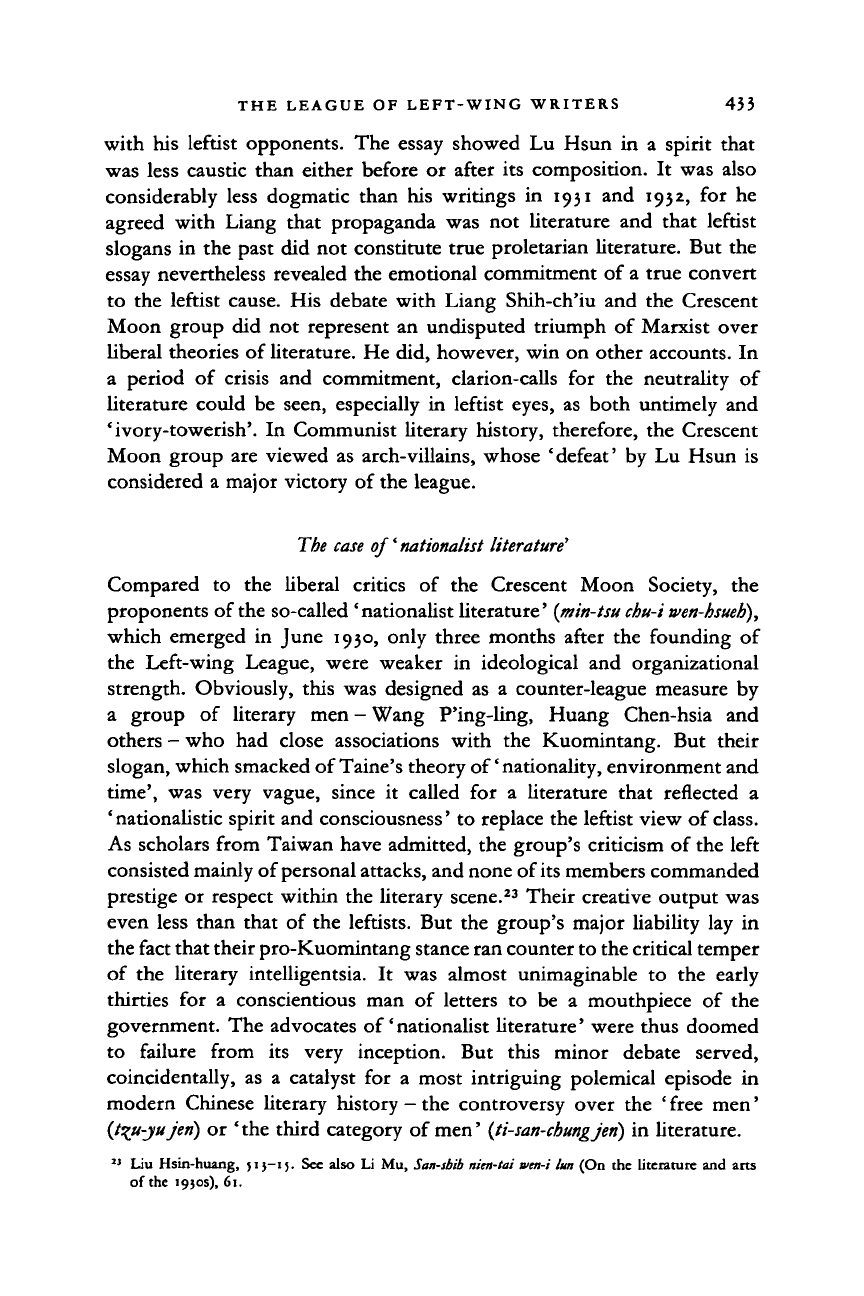
THE LEAGUE OF LEFT-WING WRITERS 433
with his leftist opponents. The essay showed Lu Hsun in a spirit that
was less caustic than either before or after its composition. It was also
considerably less dogmatic than his writings in 1931 and 1932, for he
agreed with Liang that propaganda was not literature and that leftist
slogans in the past did not constitute true proletarian literature. But the
essay nevertheless revealed the emotional commitment of a true convert
to the leftist cause. His debate with Liang Shih-ch'iu and the Crescent
Moon group did not represent an undisputed triumph of Marxist over
liberal theories of literature. He did, however, win on other accounts. In
a period of crisis and commitment, clarion-calls for the neutrality of
literature could be seen, especially in leftist eyes, as both untimely and
'ivory-towerish'. In Communist literary history, therefore, the Crescent
Moon group are viewed as arch-villains, whose 'defeat' by Lu Hsun is
considered a major victory of the league.
The
case
of'
nationalist
literature'
Compared to the liberal critics of the Crescent Moon Society, the
proponents of the so-called 'nationalist literature'
{min-tsu chu-i
wen-bsueti),
which emerged in June 1930, only three months after the founding of
the Left-wing League, were weaker in ideological and organizational
strength. Obviously, this was designed as a counter-league measure by
a group of literary men - Wang P'ing-ling, Huang Chen-hsia and
others - who had close associations with the Kuomintang. But their
slogan, which smacked of Taine's theory of 'nationality, environment and
time',
was very vague, since it called for a literature that reflected a
' nationalistic spirit and consciousness' to replace the leftist view of class.
As scholars from Taiwan have admitted, the group's criticism of the left
consisted mainly of personal attacks, and none of its members commanded
prestige or respect within the literary scene.
23
Their creative output was
even less than that of the leftists. But the group's major liability lay in
the fact that their pro-Kuomintang stance ran counter to the critical temper
of the literary intelligentsia. It was almost unimaginable to the early
thirties for a conscientious man of letters to be a mouthpiece of the
government. The advocates of' nationalist literature' were thus doomed
to failure from its very inception. But this minor debate served,
coincidentally, as a catalyst for a most intriguing polemical episode in
modern Chinese literary history - the controversy over the ' free men'
(t%u-jujeri)
or ' the third category of men'
(ti-san-chungjeri)
in literature.
23
Liu Hsin-huang, 515-15. See also Li Mu, San-sbib nicti-tai aen-i tun (On the literature and arts
of the 1930s), 61.
Cambridge Histories Online © Cambridge University Press, 2008
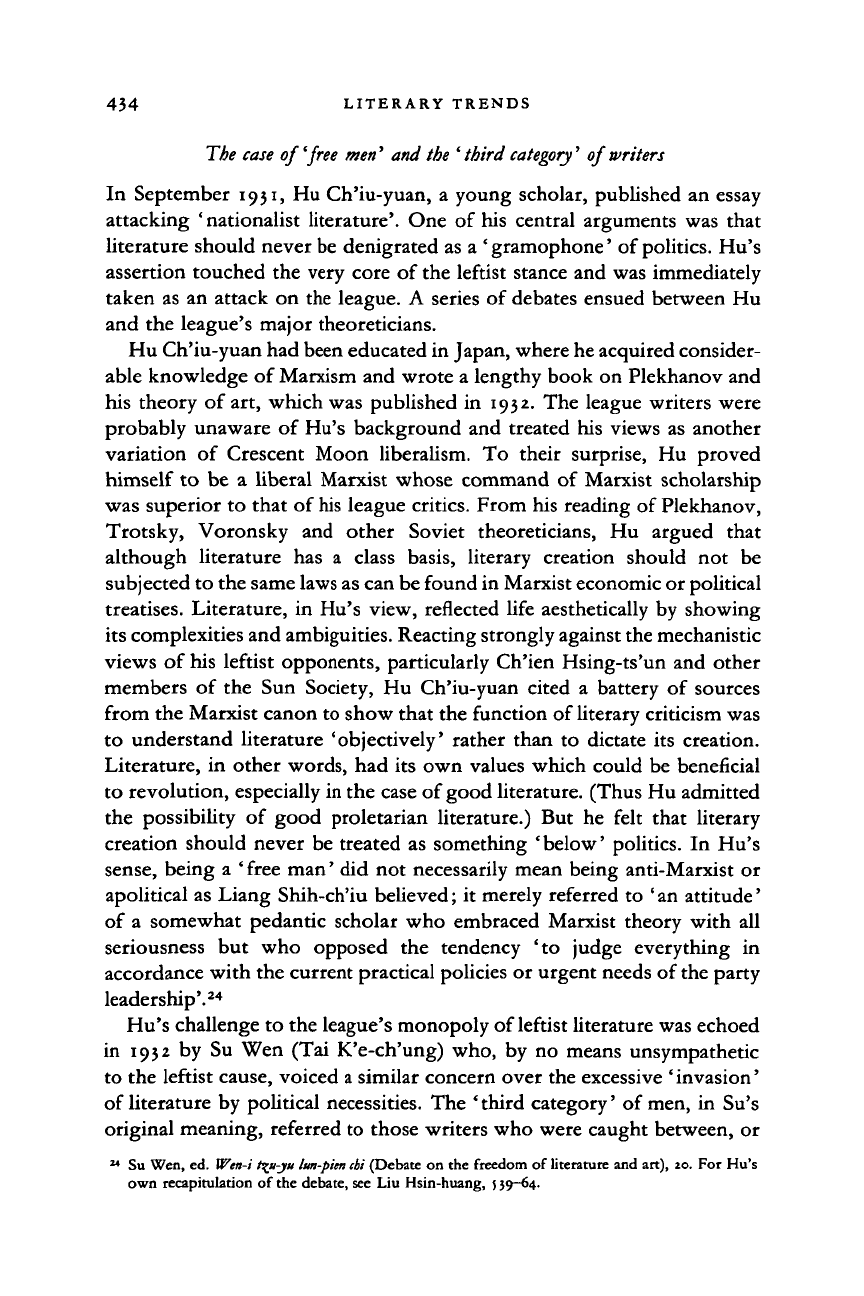
434 LITERARY TRENDS
The
case
of'free men' and the 'third
category'
of writers
In September 1931, Hu Ch'iu-yuan, a young scholar, published an essay
attacking ' nationalist literature'. One of his central arguments was that
literature should never be denigrated as a ' gramophone' of
politics.
Hu's
assertion touched the very core of the leftist stance and was immediately
taken as an attack on the league. A series of debates ensued between Hu
and the league's major theoreticians.
Hu Ch'iu-yuan had been educated in Japan, where he acquired consider-
able knowledge of Marxism and wrote a lengthy book on Plekhanov and
his theory of art, which was published in 1932. The league writers were
probably unaware of Hu's background and treated his views as another
variation of Crescent Moon liberalism. To their surprise, Hu proved
himself to be a liberal Marxist whose command of Marxist scholarship
was superior to that of
his
league critics. From his reading of Plekhanov,
Trotsky, Voronsky and other Soviet theoreticians, Hu argued that
although literature has a class basis, literary creation should not be
subjected to the same laws as can be found in Marxist economic or political
treatises. Literature, in Hu's view, reflected life aesthetically by showing
its complexities and ambiguities. Reacting strongly against the mechanistic
views of his leftist opponents, particularly Ch'ien Hsing-ts'un and other
members of the Sun Society, Hu Ch'iu-yuan cited a battery of sources
from the Marxist canon to show that the function of literary criticism was
to understand literature 'objectively' rather than to dictate its creation.
Literature, in other words, had its own values which could be beneficial
to revolution, especially in the case of good literature. (Thus Hu admitted
the possibility of good proletarian literature.) But he felt that literary
creation should never be treated as something 'below' politics. In Hu's
sense, being a ' free man' did not necessarily mean being anti-Marxist or
apolitical as Liang Shih-ch'iu believed; it merely referred to
' an
attitude'
of a somewhat pedantic scholar who embraced Marxist theory with all
seriousness but who opposed the tendency 'to judge everything in
accordance with the current practical policies or urgent needs of the party
leadership'.
24
Hu's challenge to the league's monopoly of leftist literature was echoed
in 1932 by Su Wen (Tai K'e-ch'ung) who, by no means unsympathetic
to the leftist cause, voiced a similar concern over the excessive ' invasion'
of literature by political necessities. The ' third category' of men, in Su's
original meaning, referred to those writers who were caught between, or
M
Su Wen, ed. Wen-i
top-ju
lun-pien cbi
(Debate on the freedom of literature and art), 20. For Hu's
own recapitulation of the debate, see Liu Hsin-huang,
5
59-64.
Cambridge Histories Online © Cambridge University Press, 2008
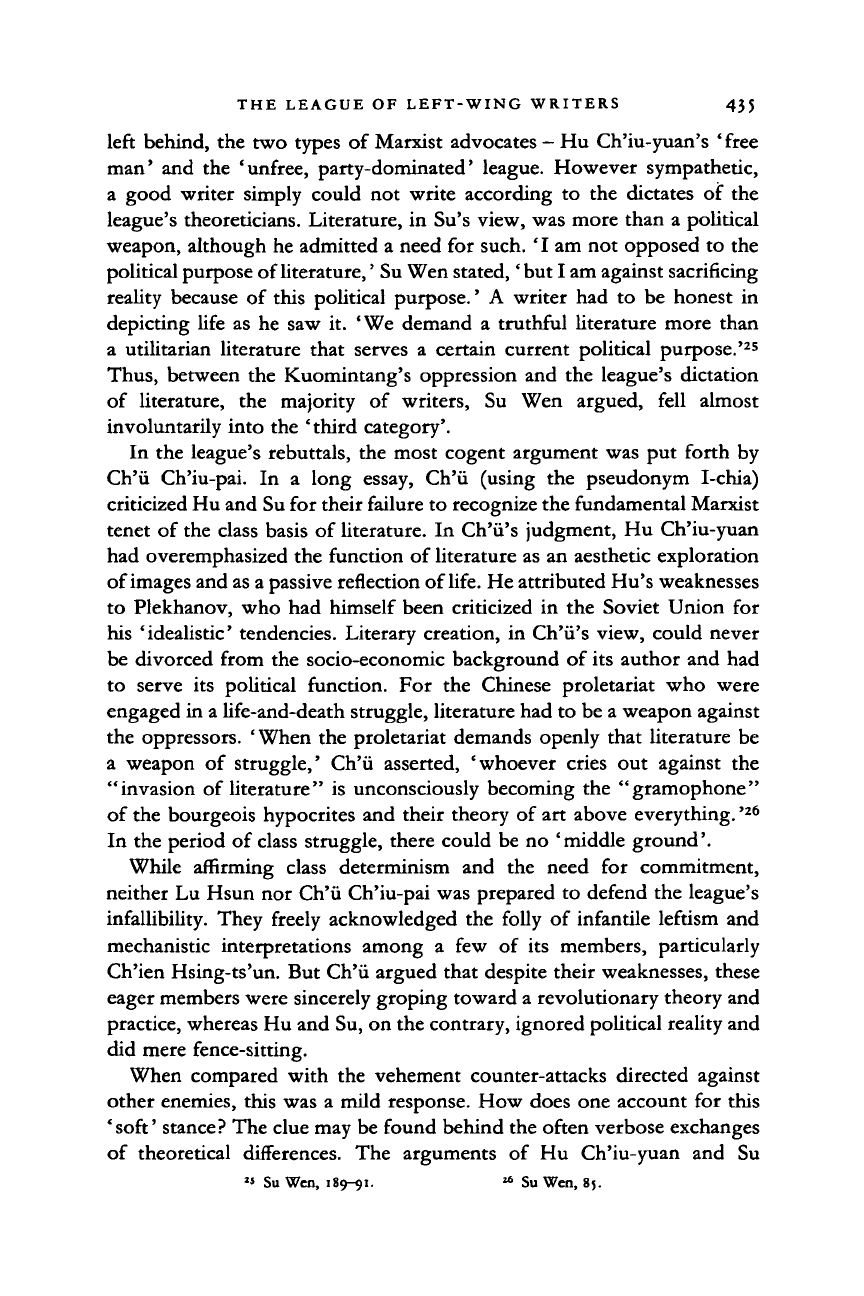
THE LEAGUE OF LEFT-WING WRITERS 435
left behind, the two types of Marxist advocates - Hu Ch'iu-yuan's ' free
man' and the 'unfree, party-dominated' league. However sympathetic,
a good writer simply could not write according to the dictates of the
league's theoreticians. Literature, in Su's view, was more than a political
weapon, although he admitted a need for such. ' I am not opposed to the
political purpose of literature,' Su Wen stated, 'but I am against sacrificing
reality because of this political purpose.' A writer had to be honest in
depicting life as he saw it. 'We demand a truthful literature more than
a utilitarian literature that serves a certain current political purpose.'
25
Thus,
between the Kuomintang's oppression and the league's dictation
of literature, the majority of writers, Su Wen argued, fell almost
involuntarily into the 'third category'.
In the league's rebuttals, the most cogent argument was put forth by
Ch'ii Ch'iu-pai. In a long essay, Ch'ii (using the pseudonym I-chia)
criticized Hu and Su for their failure to recognize the fundamental Marxist
tenet of the class basis of literature. In Ch'ii's judgment, Hu Ch'iu-yuan
had overemphasized the function of literature as an aesthetic exploration
of images and as a passive reflection of
life.
He attributed Hu's weaknesses
to Plekhanov, who had himself been criticized in the Soviet Union for
his 'idealistic' tendencies. Literary creation, in Ch'ii's view, could never
be divorced from the socio-economic background of its author and had
to serve its political function. For the Chinese proletariat who were
engaged in a life-and-death struggle, literature had to be a weapon against
the oppressors. 'When the proletariat demands openly that literature be
a weapon of struggle,' Ch'ii asserted, 'whoever cries out against the
" invasion of literature " is unconsciously becoming the " gramophone "
of the bourgeois hypocrites and their theory of art above everything. '
a6
In the period of class struggle, there could be no 'middle ground'.
While affirming class determinism and the need for commitment,
neither Lu Hsun nor Ch'ii Ch'iu-pai was prepared to defend the league's
infallibility. They freely acknowledged the folly of infantile leftism and
mechanistic interpretations among a few of its members, particularly
Ch'ien Hsing-ts'un. But Ch'ii argued that despite their weaknesses, these
eager members were sincerely groping toward a revolutionary theory and
practice, whereas Hu and Su, on the contrary, ignored political reality and
did mere fence-sitting.
When compared with the vehement counter-attacks directed against
other enemies, this was a mild response. How does one account for this
'soft' stance? The clue may be found behind the often verbose exchanges
of theoretical differences. The arguments of Hu Ch'iu-yuan and Su
" Su Wen, 189-91. " Su Wen, 85.
Cambridge Histories Online © Cambridge University Press, 2008
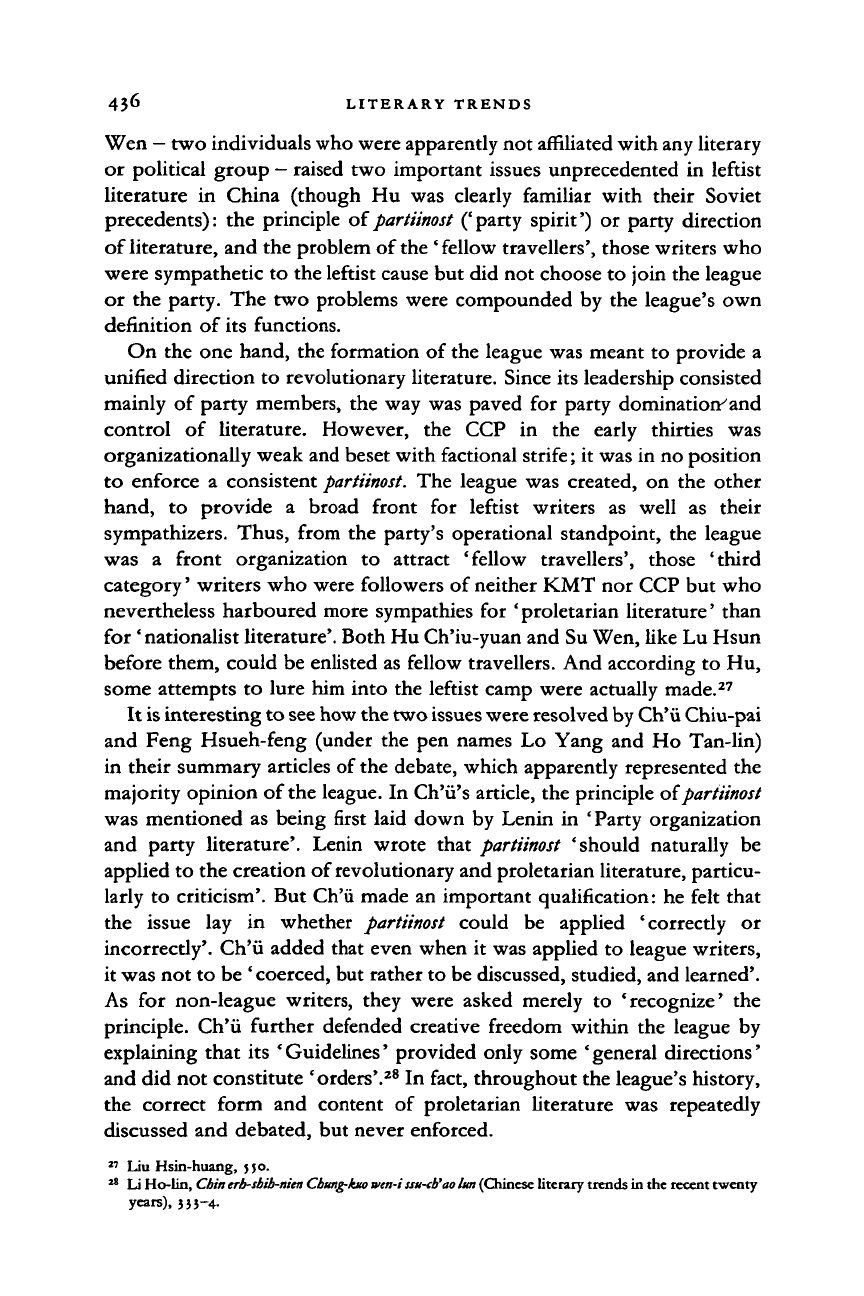
LITERARY TRENDS
Wen
—
two individuals who were apparently not affiliated with any literary
or political group - raised two important issues unprecedented in leftist
literature in China (though Hu was clearly familiar with their Soviet
precedents): the principle of
partiinost
('party spirit') or party direction
of literature, and the problem of the ' fellow travellers', those writers who
were sympathetic to the leftist cause but did not choose to join the league
or the party. The two problems were compounded by the league's own
definition of its functions.
On the one hand, the formation of the league was meant to provide a
unified direction to revolutionary literature. Since its leadership consisted
mainly of party members, the way was paved for party domination'and
control of literature. However, the CCP in the early thirties was
organizationally weak and beset with factional strife; it was in no position
to enforce a consistent
partiinost.
The league was created, on the other
hand, to provide a broad front for leftist writers as well as their
sympathizers. Thus, from the party's operational standpoint, the league
was a front organization to attract 'fellow travellers', those 'third
category' writers who were followers of neither KMT nor CCP but who
nevertheless harboured more sympathies for 'proletarian literature' than
for' nationalist literature'. Both Hu Ch'iu-yuan and Su Wen, like Lu Hsun
before them, could be enlisted as fellow travellers. And according to Hu,
some attempts to lure him into the leftist camp were actually made.
27
It
is
interesting to see how the two
issues
were resolved by Ch'ii Chiu-pai
and Feng Hsueh-feng (under the pen names Lo Yang and Ho Tan-lin)
in their summary articles of the debate, which apparently represented the
majority opinion of the league. In Ch'ii's article, the principle oipartiinost
was mentioned as being first laid down by Lenin in 'Party organization
and party literature'. Lenin wrote that partiinost 'should naturally be
applied to the creation of revolutionary and proletarian literature, particu-
larly to criticism'. But Ch'ii made an important qualification: he felt that
the issue lay in whether partiinost could be applied 'correctly or
incorrectly'. Ch'ii added that even when it was applied to league writers,
it was not to be ' coerced, but rather to be discussed, studied, and learned'.
As for non-league writers, they were asked merely to 'recognize' the
principle. Ch'ii further defended creative freedom within the league by
explaining that its 'Guidelines' provided only some 'general directions'
and did not constitute 'orders'.
28
In fact, throughout the league's history,
the correct form and content of proletarian literature was repeatedly
discussed and debated, but never enforced.
27
Liu Hsin-huang, 550.
28
Li Ho-lin, Chin crb-sbib-men Cbung-hto aen-i ssu-cb'ao lun (Chinese literary trends in the recent twenty
years), 333-4.
Cambridge Histories Online © Cambridge University Press, 2008
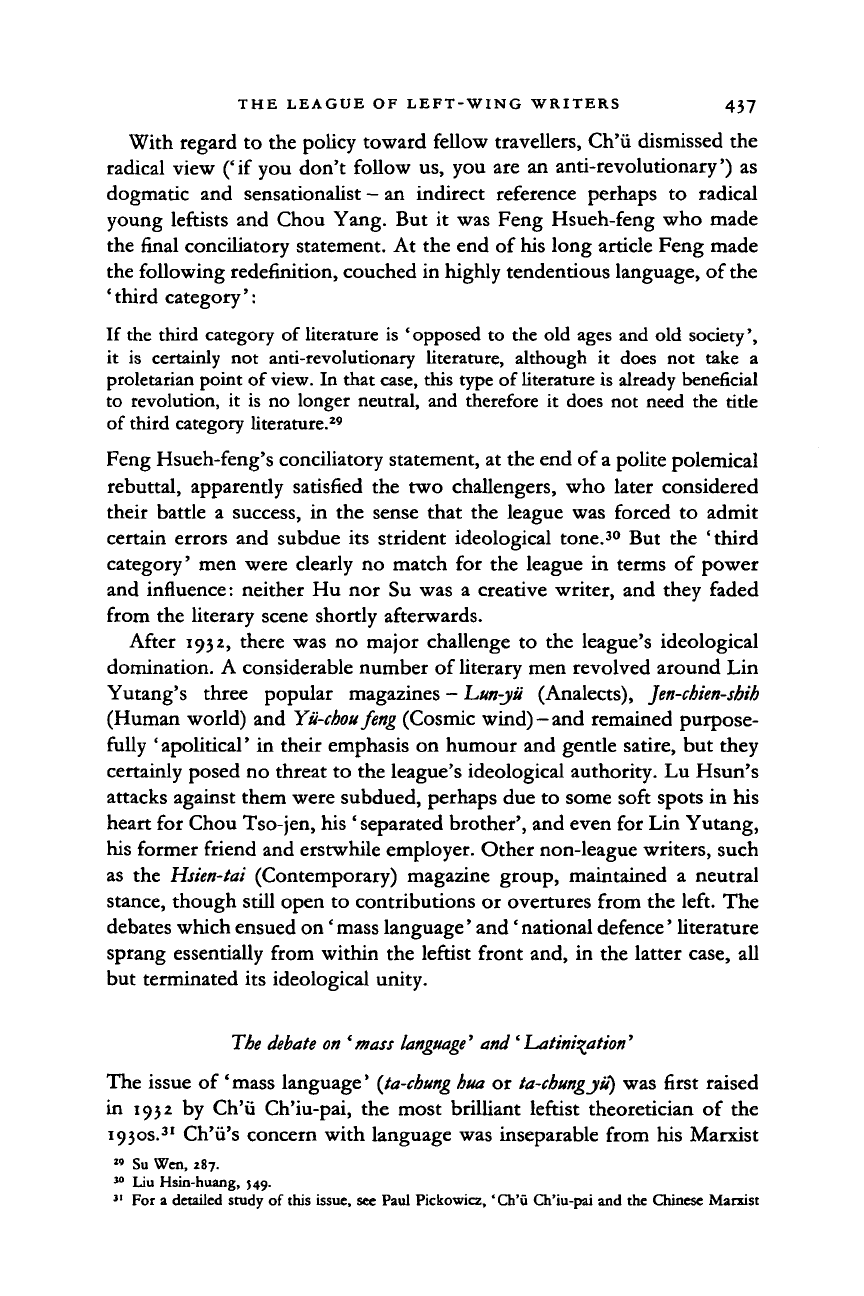
THE LEAGUE OF LEFT-WING WRITERS 437
With regard to the policy toward fellow travellers, Ch'u dismissed the
radical view ('if you don't follow us, you are an anti-revolutionary') as
dogmatic and sensationalist
—
an indirect reference perhaps to radical
young leftists and Chou Yang. But it was Feng Hsueh-feng who made
the final conciliatory statement. At the end of his long article Feng made
the following redefinition, couched in highly tendentious language, of the
' third category':
If the third category of literature is ' opposed to the old ages and old society',
it is certainly not anti-revolutionary literature, although it does not take a
proletarian point of
view.
In that case, this type of literature is already beneficial
to revolution, it is no longer neutral, and therefore it does not need the tide
of third category literature.
29
Feng Hsueh-feng's conciliatory statement, at the end of
a
polite polemical
rebuttal, apparently satisfied the two challengers, who later considered
their battle a success, in the sense that the league was forced to admit
certain errors and subdue its strident ideological tone.
30
But the 'third
category' men were clearly no match for the league in terms of power
and influence: neither Hu nor Su was a creative writer, and they faded
from the literary scene shortly afterwards.
After 1932, there was no major challenge to the league's ideological
domination. A considerable number of literary men revolved around Lin
Yutang's three popular magazines
—
Lun-jii (Analects),
]en-chien-sbih
(Human world) and Yu-chou feng (Cosmic wind)-and remained purpose-
fully
'
apolitical' in their emphasis on humour and gentle satire, but they
certainly posed no threat to the league's ideological authority. Lu Hsun's
attacks against them were subdued, perhaps due to some soft spots in his
heart for Chou Tso-jen, his ' separated brother', and even for Lin Yutang,
his former friend and erstwhile employer. Other non-league writers, such
as the Hsien-tai (Contemporary) magazine group, maintained a neutral
stance, though still open to contributions or overtures from the left. The
debates which ensued on'
mass
language' and' national defence' literature
sprang essentially from within the leftist front and, in the latter case, all
but terminated its ideological unity.
The
debate
on 'mass
language'
and 'Latini^ation'
The issue of '
mass
language'
(ta-chung hua
or
ta-chungyit)
was first raised
in 1932 by Ch'ii Ch'iu-pai, the most brilliant leftist theoretician of the
1930s.
31
Ch'ii's concern with language was inseparable from his Marxist
n
Su Wen, 287.
30
Liu Hsin-huang, 549.
11
For a detailed study of this issue, see Paul Pickowicz, 'Ch'u Ch'iu-pai and the Chinese Marxist
Cambridge Histories Online © Cambridge University Press, 2008
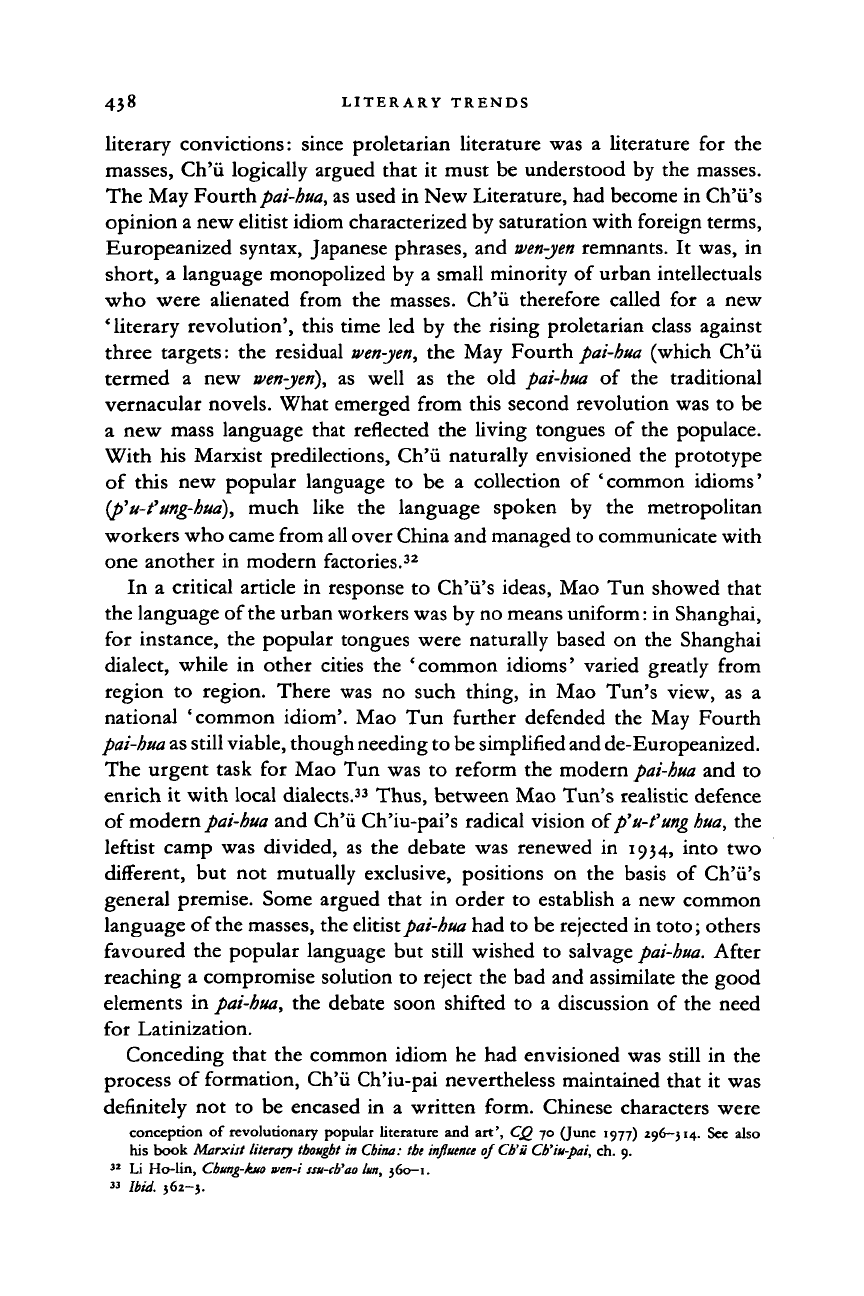
438 LITERARY TRENDS
literary convictions: since proletarian literature was
a
literature
for
the
masses, Ch'ii logically argued that
it
must be understood by the masses.
The May Fourth
pai-hua,
as used in New Literature, had become in Ch'ii's
opinion a new elitist idiom characterized by saturation with foreign terms,
Europeanized syntax, Japanese phrases, and
wen-yen
remnants.
It
was,
in
short,
a
language monopolized by a small minority of urban intellectuals
who were alienated from the masses. Ch'ii therefore called
for a
new
'literary revolution', this time led by the rising proletarian class against
three targets: the residual
wen-yen,
the May Fourth
pai-hua
(which Ch'ii
termed
a
new
wen-yen),
as
well
as the
old pai-hua
of
the traditional
vernacular novels. What emerged from this second revolution was to be
a new mass language that reflected the living tongues
of
the populace.
With his Marxist predilections, Ch'ii naturally envisioned the prototype
of this new popular language
to be a
collection
of
'common idioms'
(p'u-t'ung-hua), much like
the
language spoken
by the
metropolitan
workers who came from all over China and managed to communicate with
one another in modern factories.
32
In
a
critical article in response to Ch'ii's ideas, Mao Tun showed that
the language of the urban workers was by no means uniform: in Shanghai,
for instance, the popular tongues were naturally based on the Shanghai
dialect, while
in
other cities the 'common idioms' varied greatly from
region
to
region. There was
no
such thing,
in
Mao Tun's view,
as a
national 'common idiom'. Mao Tun further defended the May Fourth
pai-hua as
still viable, though needing to be simplified and de-Europeanized.
The urgent task for Mao Tun was
to
reform the modern
pai-hua
and
to
enrich
it
with local dialects.
33
Thus, between Mao Tun's realistic defence
of modern
pai-hua
and Ch'ii Ch'iu-pai's radical vision oip'u-fung
hua,
the
leftist camp was divided, as the debate was renewed
in
1934, into two
different,
but not
mutually exclusive, positions
on
the basis
of
Ch'ii's
general premise. Some argued that in order to establish
a
new common
language of the masses, the elitist
pai-hua
had to be rejected in toto; others
favoured the popular language but still wished
to
salvage
pai-hua.
After
reaching a compromise solution to reject the bad and assimilate the good
elements in
pai-hua,
the debate soon shifted
to a
discussion
of
the need
for Latinization.
Conceding that the common idiom he had envisioned was still in the
process of formation, Ch'ii Ch'iu-pai nevertheless maintained that
it
was
definitely not
to
be encased in
a
written form. Chinese characters were
conception
of
revolutionary popular literature and art', CQ 70 (June 1977) 296-314. See also
his book Marxist
literary thought
in
China:
the influence
ofCb'u
Ch'iu-pai,
ch.
9.
32
Li Ho-lin,
Chung-kuo
wtn-i
tsu-cb'ao
lim,
360-1.
"
Ibid.
362-3.
Cambridge Histories Online © Cambridge University Press, 2008
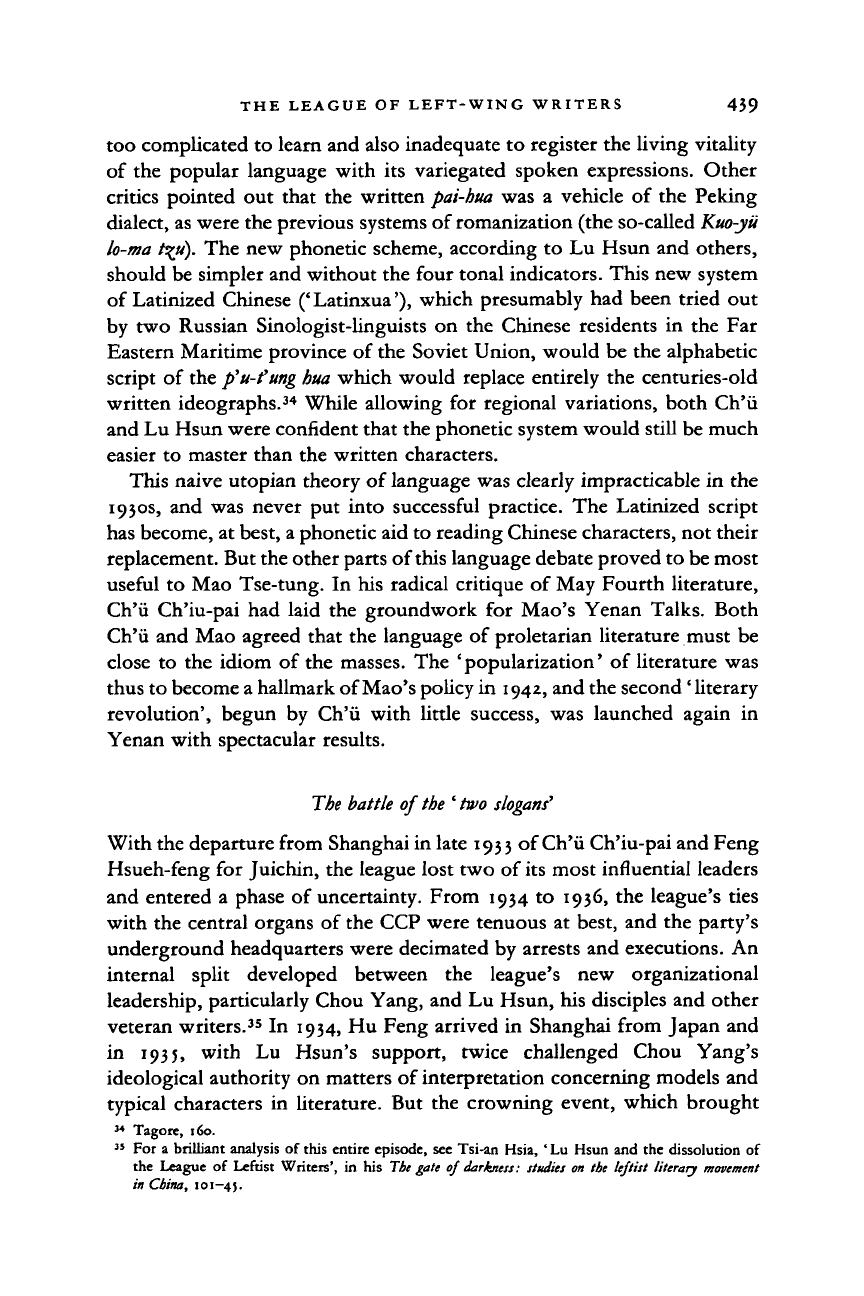
THE LEAGUE OF LEFT-WING WRITERS 439
too complicated
to
learn and also inadequate
to
register the living vitality
of
the
popular language with
its
variegated spoken expressions. Other
critics pointed
out
that
the
written
pai-hua
was a
vehicle
of the
Peking
dialect, as were the previous systems
of
romanization (the so-called
Kuo-jii
lo-ma
t%u).
The new phonetic scheme, according
to Lu
Hsun
and
others,
should be simpler and without the four tonal indicators. This new system
of Latinized Chinese
('
Latinxua'),
which presumably
had
been tried
out
by
two
Russian Sinologist-linguists
on the
Chinese residents
in the Far
Eastern Maritime province
of
the Soviet Union, would
be
the alphabetic
script
of
the
p'u-fung
hua
which would replace entirely
the
centuries-old
written ideographs.
34
While allowing
for
regional variations, both Ch'ii
and Lu Hsun were confident that the phonetic system would still be much
easier
to
master than
the
written characters.
This naive Utopian theory
of
language was clearly impracticable
in the
1930s,
and was
never
put
into successful practice.
The
Latinized script
has become,
at
best, a phonetic aid to reading Chinese characters, not their
replacement. But the other parts of this language debate proved to be most
useful
to
Mao Tse-tung.
In his
radical critique
of
May Fourth literature,
Ch'ii Ch'iu-pai
had
laid
the
groundwork
for
Mao's Yenan Talks. Both
Ch'ii
and
Mao agreed that
the
language
of
proletarian literature must
be
close
to the
idiom
of
the masses.
The
' popularization'
of
literature
was
thus to become a hallmark of Mao's policy in 1942, and the second' literary
revolution', begun
by
Ch'ii with little success,
was
launched again
in
Yenan with spectacular results.
The battle
of
the
'
two
slogans'
With the departure from Shanghai in late 1933 of Ch'ii Ch'iu-pai and Feng
Hsueh-feng
for
Juichin,
the
league lost two
of
its most influential leaders
and entered
a
phase
of
uncertainty. From 1934
to
1936,
the
league's ties
with
the
central organs
of
the CCP were tenuous
at
best,
and the
party's
underground headquarters were decimated
by
arrests and executions.
An
internal split developed between
the
league's
new
organizational
leadership, particularly Chou Yang, and
Lu
Hsun, his disciples
and
other
veteran writers.
35
In
1934,
Hu
Feng arrived
in
Shanghai from Japan
and
in
1935,
with
Lu
Hsun's support, twice challenged Chou Yang's
ideological authority
on
matters
of
interpretation concerning models
and
typical characters
in
literature.
But the
crowning event, which brought
M
Tagore,
160.
35
For
a
brilliant analysis
of
this entire episode,
see
Tsi-an Hsia,
' Lu
Hsun and
the
dissolution
of
the League
of
Leftist Writers',
in his
The gate
of
darkness: studies
on tbe
leftist literary movement
in China, 101—45.
Cambridge Histories Online © Cambridge University Press, 2008
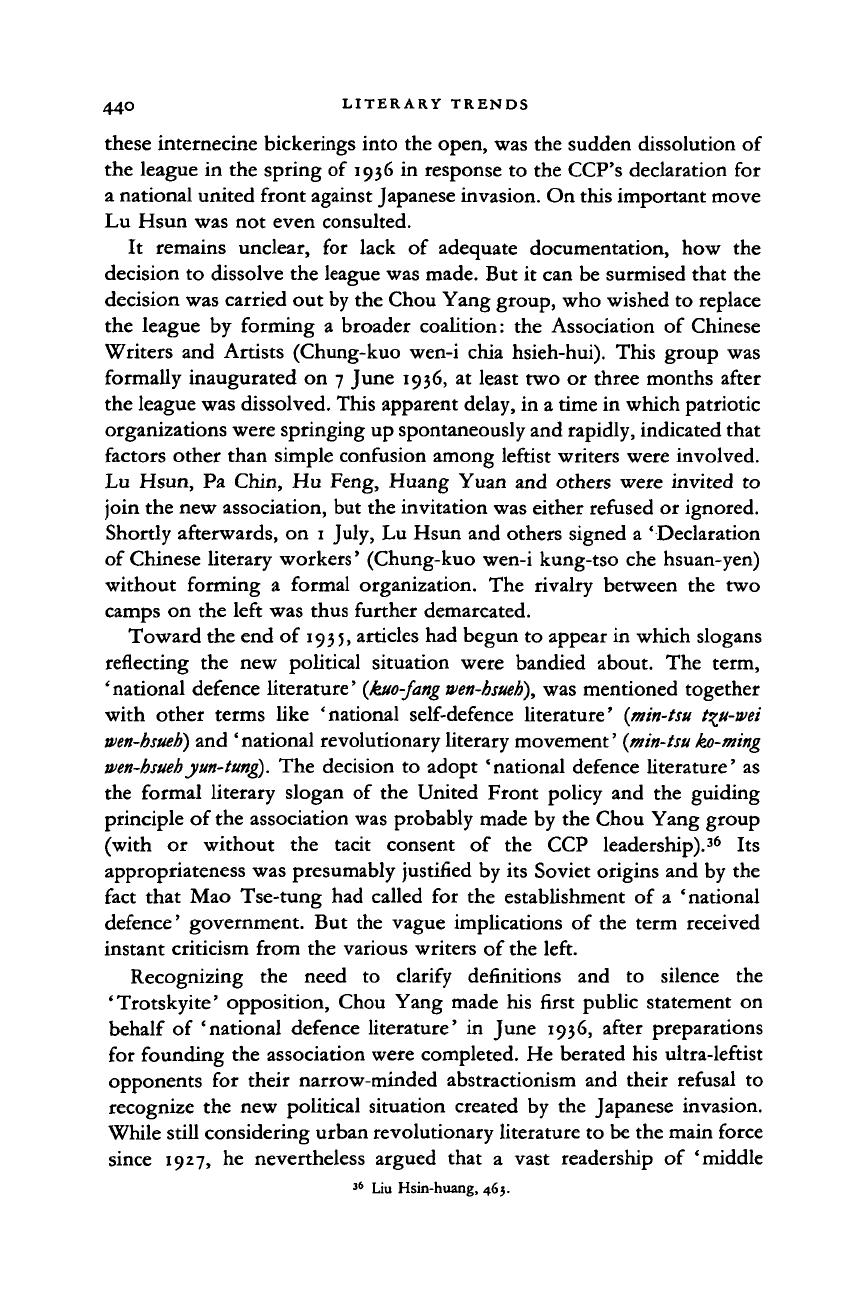
44<0 LITERARY TRENDS
these internecine bickerings into
the
open, was
the
sudden dissolution
of
the league
in the
spring
of
1936
in
response
to the
CCP's declaration
for
a national united front against Japanese invasion.
On
this important move
Lu Hsun
was not
even consulted.
It remains unclear,
for
lack
of
adequate documentation,
how the
decision
to
dissolve
the
league was made.
But it can be
surmised that
the
decision was carried
out
by the Chou Yang group, who wished
to
replace
the league
by
forming
a
broader coalition:
the
Association
of
Chinese
Writers
and
Artists (Chung-kuo wen-i chia hsieh-hui). This group
was
formally inaugurated
on
7 June 1936,
at
least
two or
three months after
the league was dissolved. This apparent delay,
in a
time
in
which patriotic
organizations were springing up spontaneously and rapidly, indicated that
factors other than simple confusion among leftist writers were involved.
Lu Hsun,
Pa
Chin,
Hu
Feng, Huang Yuan
and
others were invited
to
join the new association,
but
the invitation was either refused
or
ignored.
Shortly afterwards,
on
1 July,
Lu
Hsun
and
others signed
a
'Declaration
of Chinese literary workers' (Chung-kuo wen-i kung-tso
che
hsuan-yen)
without forming
a
formal organization.
The
rivalry between
the two
camps
on the
left was thus further demarcated.
Toward
the end of
193
5,
articles
had
begun
to
appear
in
which slogans
reflecting
the new
political situation were bandied about.
The
term,
'national defence literature'
(kuo-fangwen-hsueh),
was
mentioned together
with other terms like 'national self-defence literature' {min-tsu t^u-wei
wen-hsueh)
and
'
national revolutionary literary movement'
{min-tsu ko-ming
wen-bsueh
yun-tung).
The
decision
to
adopt 'national defence literature'
as
the formal literary slogan
of the
United Front policy
and the
guiding
principle
of
the association was probably made
by the
Chou Yang group
(with
or
without
the
tacit consent
of the CCP
leadership).
36
Its
appropriateness was presumably justified
by its
Soviet origins
and by the
fact that
Mao
Tse-tung
had
called
for the
establishment
of a
'national
defence' government.
But the
vague implications
of the
term received
instant criticism from
the
various writers
of
the left.
Recognizing
the
need
to
clarify definitions
and to
silence
the
'Trotskyite' opposition, Chou Yang made
his
first public statement
on
behalf
of
'national defence literature'
in
June
1936,
after preparations
for founding
the
association were completed.
He
berated
his
ultra-leftist
opponents
for
their narrow-minded abstractionism
and
their refusal
to
recognize
the new
political situation created
by the
Japanese invasion.
While still considering urban revolutionary literature
to
be the main force
since
1927, he
nevertheless argued that
a
vast readership
of
'middle
36
Liu
Hsin-huang,
463.
Cambridge Histories Online © Cambridge University Press, 2008
